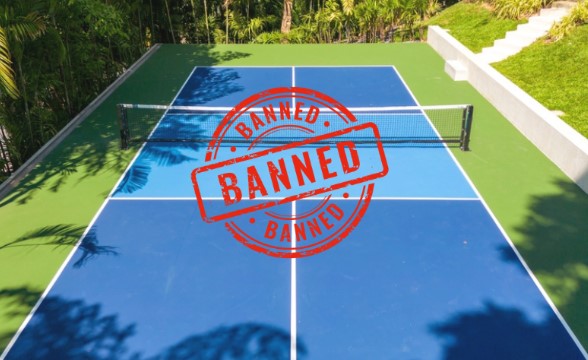Pickleball has grown rapidly in popularity over the past decade, making its way into parks, community centers, and even private clubs across the globe. While many celebrate the sport as an inclusive, fun, and engaging activity, some communities are questioning its impact. As debates arise, the question “should pickleball be banned?” has gained traction in various circles. In this article, we’ll delve into the arguments for and against banning pickleball, examining its effects on noise pollution, community dynamics, and the environment, as well as its social and health benefits.
The Rise of Pickleball

Pickleball, a paddle sport that combines elements of tennis, badminton, and table tennis, was invented in 1965. Since then, it has evolved from a backyard game into a competitive sport played by millions worldwide. According to the Sports & Fitness Industry Association (SFIA), pickleball is one of the fastest-growing sports in the United States. Its appeal lies in its accessibility: it’s easy to learn, requires minimal equipment, and caters to players of all ages and skill levels.
However, this surge in popularity has brought the sport into the spotlight—and not always in a positive way.
Arguments for Banning Pickleball
Noise Pollution
One of the most common complaints against pickleball is the noise it generates. The distinctive “pop” sound created when the paddle strikes the ball can be disruptive, especially in residential areas. Unlike tennis, which uses a softer ball, pickleball’s harder plastic ball creates a sharper sound that travels farther. For residents living near pickleball courts, this constant noise can be a nuisance, particularly during early morning or late evening games.
Overcrowding of Public Spaces
The growing demand for pickleball courts has led to the repurposing of tennis courts, basketball courts, and other recreational spaces. In some cases, this has caused tension between different user groups. Tennis players, for instance, have voiced concerns about losing access to facilities, while park-goers lament the reduction of open spaces for other activities.
Environmental Impact
As more pickleball courts are constructed, concerns about their environmental impact have emerged. Clearing land for courts can disrupt local ecosystems, and the materials used for court surfaces may contribute to environmental degradation. Additionally, the increased foot traffic in parks and recreational areas can strain local flora and fauna.
Community Conflicts
The sport’s popularity has sparked conflicts within communities. Some residents argue that pickleball attracts large groups, leading to parking congestion and overcrowded parks. Others claim that the sport’s social nature—often involving loud conversations and cheering—disrupts the peace and quiet of their neighborhoods.
Lack of Regulation
Pickleball’s rapid growth has outpaced regulations in many areas. This has resulted in disputes over court placement, usage hours, and noise control. Without clear guidelines, local governments struggle to balance the interests of pickleball enthusiasts with those of other community members.
Arguments Against Banning Pickleball
Health Benefits
One of the strongest arguments for keeping pickleball accessible is its significant health benefits. The sport provides a full-body workout, improving cardiovascular health, agility, and coordination. It’s particularly popular among older adults, offering a low-impact form of exercise that supports mobility and overall well-being. Banning pickleball could deprive communities of these health advantages.
Social Inclusion
Pickleball fosters a sense of community and inclusivity. It’s an activity that bridges generational gaps, allowing grandparents, parents, and children to play together. For many, pickleball is more than just a sport; it’s a social outlet that combats loneliness and promotes mental health.
Economic Boost
The sport’s popularity has generated economic benefits. Pickleball tournaments attract visitors, boosting local tourism and businesses. Moreover, the demand for equipment, apparel, and court construction creates jobs and supports the sporting goods industry. Banning pickleball could hinder these economic opportunities.
Adaptable Solutions
Rather than banning pickleball outright, communities can implement measures to address concerns. Installing sound barriers, enforcing restricted playing hours, and using quieter paddles and balls are potential solutions to mitigate noise complaints. Collaborative efforts between local governments, residents, and pickleball organizations can help find a balance that satisfies all parties.
Encouraging Active Lifestyles
In an era where sedentary lifestyles are linked to numerous health problems, pickleball encourages physical activity in a fun and engaging way. Banning the sport could deter people from staying active, particularly in communities where recreational options are limited.
Balancing the Debate
The debate over whether pickleball should be banned highlights the broader challenge of balancing individual interests with community needs. While some concerns are valid, outright bans may not be the most effective solution. Instead, thoughtful compromises and proactive measures can address issues without depriving communities of pickleball’s many benefits.
For instance, cities like Bend, Oregon, have implemented strategies to manage pickleball’s impact. By designating specific playing hours, creating standalone pickleball facilities away from residential areas, and investing in noise-reducing technologies, they’ve managed to reduce conflicts while preserving access to the sport.
Conclusion
The question “should pickleball be banned?” doesn’t have a one-size-fits-all answer. While the sport’s rapid growth has created challenges, banning it entirely could deprive communities of its numerous physical, social, and economic benefits. Instead, addressing concerns through thoughtful planning, regulation, and collaboration offers a more balanced approach.
Pickleball is a sport that has brought joy and connection to millions. By finding common ground, communities can ensure that its growth continues in a way that respects everyone’s needs.
Thank you for reading this article on PickballTips.org. We hope it provides valuable insights into this important debate and encourages constructive dialogue within your community.
